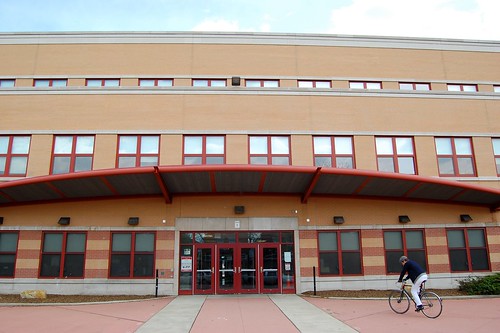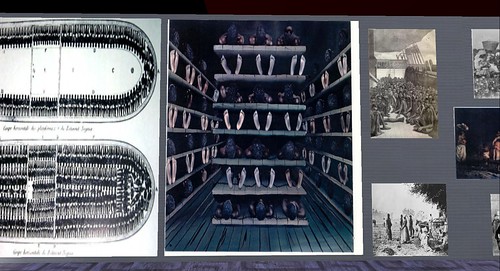A couple of months ago I wrote a post about the concept of inspiration vs. appropriation (read the conversations that followed
here on this blog, or
here where it appeared on
MulticulturalFamilia.com.) I just recently received a comment from YA author,
Terry Farish, that got me thinking about the topic again. Terry writes,
"I am a member of the dominant American culture. Here's one thought I have about people from the dominant culture writing about people in non-dominant cultures. Could it be seen as not appropriation, but as a hunger to understand. And for writers, it is through writing that we can begin to understand
our communities, our humanity, and, in this case, our multicultural country. Is this only an apology? I don't think so. I think it would far worse if white people only sought to understand other white people, only wrote about other white people. What if we lived in a world in which each ethnicity only wrote or created art about its own and no bridges were built between cultures by people trying to understand. I do think it's my responsibility to honor Sudanese writers and work to support the development of their skills of young writers.
I'd love to hear your ideas about this."
Terry, I had so many thoughts and questions for myself after reading your comment that I thought it best to just write another post. I hope you don't mind me sharing your comment with other readers. I am still trying to flesh out my thinking on appropriation vs. inspiration/appreciation/and now a hunger to understand. These thoughts are still confusing to me and are not cohesive at all (they never were, which is why I wrote that first post!) But what follows is the way I have been thinking and feeling about the subject after many discussions with other bloggers.
Seeking to understand another culture is admirable. Writing about something to understand it better is something that I do, too. But then there's this conundrum that I run into...When sitting down to write, I personally always think of Mark Twain's advice, "Write about what you know." I juxtapose that with something my husband said to me when we first started dating. My whole life, I've listened to black music, loved black culture, and felt like I really identified with black people. He said to me,
"You can do all that, but you will never know what it feels like to be black.
I can't take this skin off."
Powerful lesson there. He said that to me 20 years ago and I still think about it every day. I can never know what it is like to be in brown skin, in his skin, in the skin of my children; but I
can see firsthand how it feels to watch the world treat them based on their skin. I can't tell their stories because I don't really know their stories. I only know
my story: the story of a white woman married to a black man who is the mother of three brown children
. So that is the story I choose to tell. I write about what I know, not what I presume to know by observing their lives.
While I agree that it might be boring if white people only told white people stories, I can also say with 100% certainty that if a white woman who'd never been in an interracial marriage or raised biracial children wrote a book about the mixed family experience---even though they'd never been in a mixed family themselves---I would be suspicious, maybe even offended. They would have to do a really excellent job of researching and writing, and even then I would be doubtful of their motives, of their honesty. It would
really bother me. To have someone write a story about my life situation, without ever having experienced that situation for themselves, would seem very inauthentic. It would bother me even more if they profited from telling that story.
Yet, that's what writers do. They create fictional stories, they pretend to be someone else. I think life would be really boring if they didn't create those stories. I love to read and learn, but thinking about appropriation has made me reconsider the kinds of stories I want to read. I've decided to make a conscious effort to read authentic voices. That doesn't mean that I won't read books by white authors who write about other cultures, though.
Here's an example of a white author I admire, who tells stories from a different cultural perspective--
Barbara Kingsolver.
The Poisonwood Bible was an amazing book to me because while it was a book that took place in the Congo, what it really described was a specific part of European-American culture (missionaries) and their intersection with Congolese culture. Kingsolver managed to teach me a lot about the Belgian Congo in the 1950s, but did so by telling the story of a white character's experiences in that culture. She didn't narrate someone else's story. In another book,
The Lacuna, she again taught me about another culture by writing about life in Mexico from the point of view of a half white and half Mexican character. She focused a lot on the whiteness/American-ness of that character, and how he didn't exactly fit in even though he lived in Mexico and was half Mexican. Is her character problematic for real life mixed Mexican-Americans? I don't know. But I was impressed that she so carefully crafted a story about another culture that still managed to be told authentically from her own white perspective.
Reading from the perspective of that mixed character in
The Lacuna made me think of something else: I can think of many, many white authors who have written from the perspective of a person of color. There are too many to list or name, and they are in every genre of literature.
But how many writers of color are there who write stories from another cultural perspective? Can you think of any? I can't. The only book I can think of is
The Remains of the Day by Kazuo Ishiguro. I remember reading that book for a class in college and having my fellow students comment how strange it was to read a book about an English butler written by a Japanese man...
It seems to me that white people feel they can write from any perspective they want to, but the same is not true for people of color. White people can say that we are trying to understand, and that our quest for learning justifies writing from another cultural point of view in order to bridge gaps....and I really think that is a noble purpose. I really do. But at the same time we have to realize that writers of color do not have that same privilege. Their stories are not being told, shared, or published as often as the white versions of their stories. And just as I would be offended if someone else wrote my story, so are many people of color offended when white authors keep telling their stories.
I haven't read your books, Terry. I just looked at your website after you commented on this blog. I don't know how you approach your cultural subjects or who the characters are in your books. I do know a lot of social-justice minded white writers who want to bridge cultures and share new perspectives with white readers, and I think that it is important work. But I am personally always reminded of what my husband said to me 20 years ago, "You will never know how it feels to be black." My 20 years of being the only white person in my household gives me a huge research base to draw from. I could use that experience to write a story from a black perspective, trying to give white readers a better understanding of black culture; but there is no way I could really get it right. I am not black and I never will be. My story wouldn't be authentic. Personally, I'd much rather foster and support a writer of color who can share their own story. If I write my own story, it would be the authentic story of how a white woman can interact with and learn to love black culture. That is my story to tell, and I believe it can bridge gaps just as well as (maybe even better than) a story I could write from a cultural perspective that is not mine.







